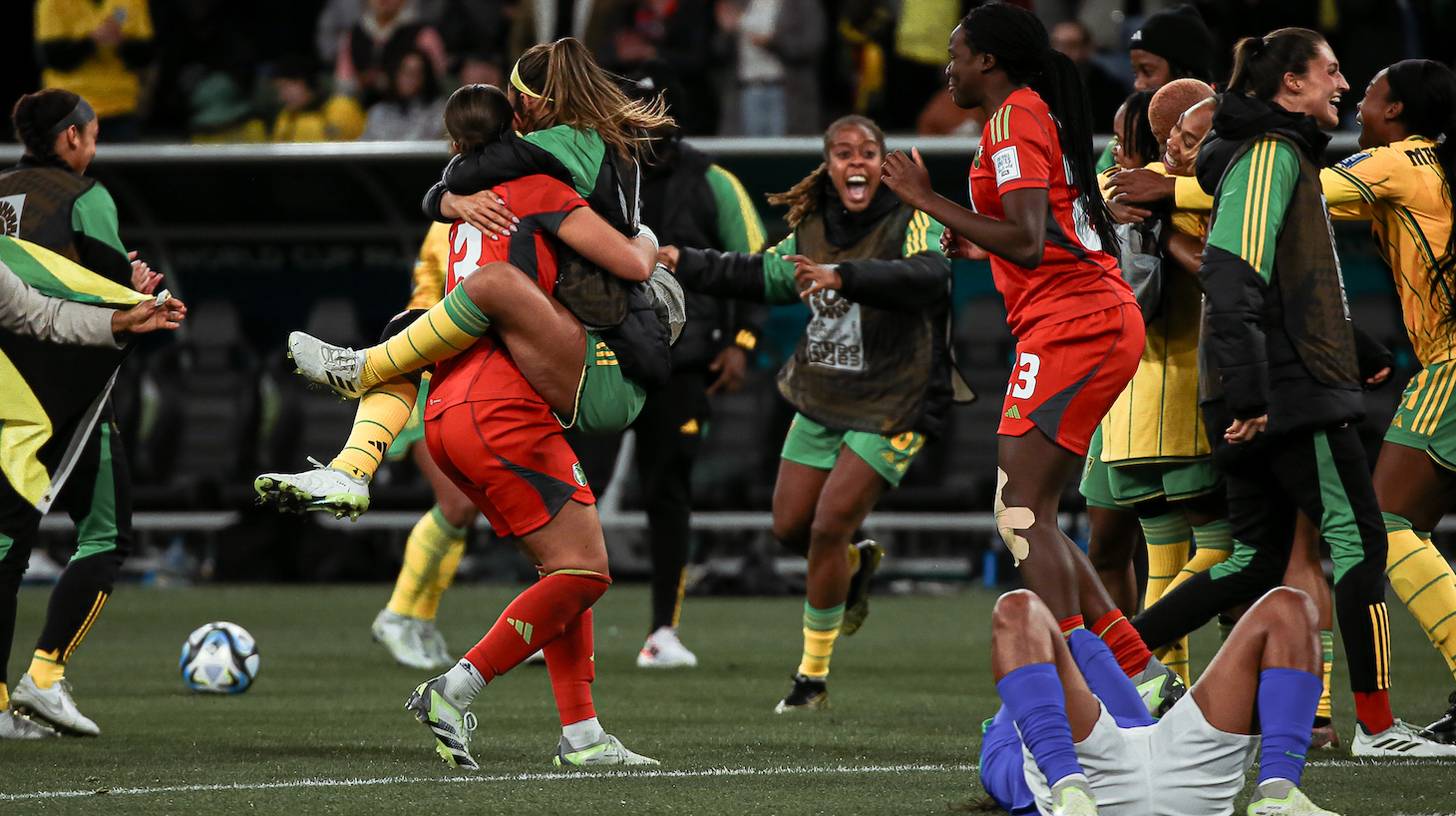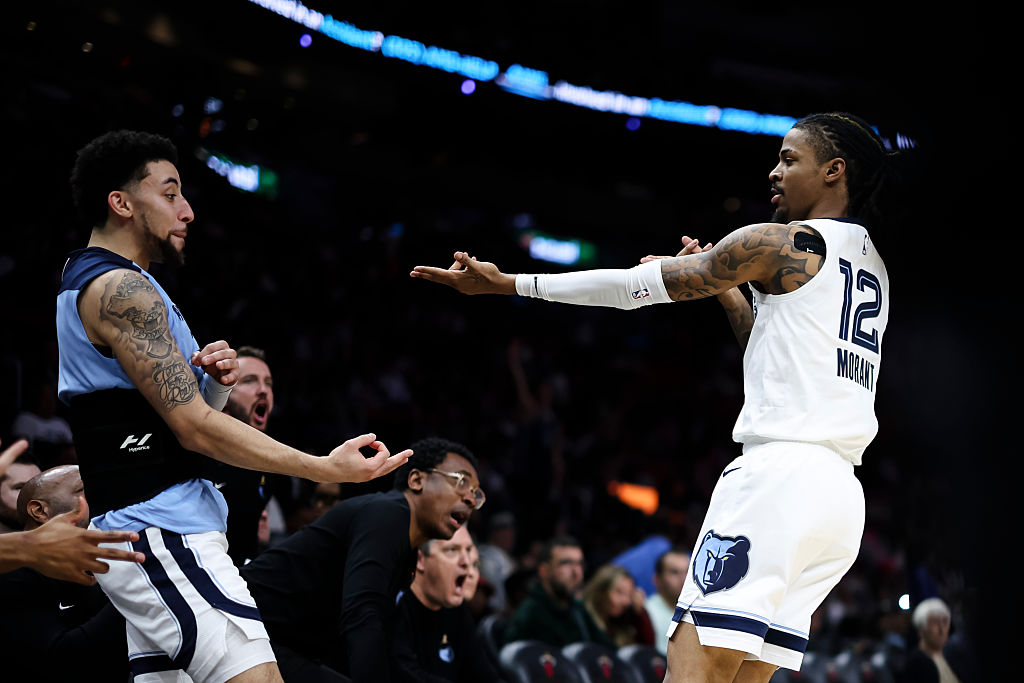As mentioned before, matches in the last round of the group stage often suck. Sometimes they're great, though, usually when two teams with mutually exclusive dreams of making it out of the group face off in what is in effect a knockout match itself. Wednesday's Jamaica-Brazil game was one such pre–knockout round knockout match, and although the match had no winner, the victorious team was the one that did its job by avoiding a loss.
In a match with as much attacking firepower as this one—proven weapons like Marta, Khadija Shaw, Debinha, Jody Brown, Kerolin, Geyse Ferreira, and Ary Borges all stepped onto the pitch on Wednesday—you might've expected a goalfest. Not only that, you probably would've predicted a lopsided Brazil victory, given that the heavily favored Brazilians are a much better team and had already shown off their scintillating talent during this World Cup. But on Wednesday all of those stellar attackers were overshadowed and overpowered by Jamaica's defense, principally the center back duo of Allyson and Chantelle Swaby. That the predicted cascade of Brazilian goals never materialized had a lot to do with the Brazilian players' lack of sharpness and jittery nerves, but it mostly was because the Swaby sisters ruled their domain with an iron fist.
Jamaica spent most of the match locked inside its own penalty box, wholly surrounded by Brazilians desperate to score the goal they needed in order to make it to the next round. But the Jamaicans were perfectly content with the siege. Needing only a point to secure passage into the knockouts, and fortified with a steel backbone provided by the Swaby sisters, the Reggae Girlz were confident that they were better equipped to withstand the waves of Brazilian attacks than the Brazilians were equipped to breach Jamaica's walls. Brazil had possession of the ball for 73 percent of the time, and spent it lobbing cross after cross, shot after shot, pass after pass into the Jamaican box, hoping one of them would create the goal that would deliver them to the knockouts. Jamaica was up for the task. They only conceded 18 shots, cleared the ball 49 times (22 of those clearances coming from the Swabys), and made sure to cordon off the most dangerous locations of the penalty area, so that when Brazil was able to take aim at goal their shots were harried and from tough angles.
Jamaica did little with the ball other than clobber it far away from the Brazilians and reset their defense, but they didn't have to; protecting their own penalty area was enough to keep their World Cup going. But when the Jamaicans did get the ball, they wisely kept things simple: avoid a dangerous turnover by hitting the ball out to Shaw or Brown, rely on the speed and hold-up play of those two to push Brazil backwards to give the defense a break from battening the hatches, and stay prepared for the next Brazilian attack. Shaw performed this thankless but important task well. Jamaica managed the odd dangerous counter from time to time, mostly due to Shaw's efforts, and that implicit threat kept Brazil's defense honest and maintained pressure on the Brazilians, who could never feel totally safe.
Brazil started the match with the patient but determined attitude you'd like to see from a presumptive favorite in a match like this, but it didn't take long for that to give way to anxiety and haste. Brazil has had moments of brilliance in this tournament, but also consistent spells of disjointedness, rushed decision-making, and an inability to react to a match as it changed. All of that was present on Wednesday. The Brazilians orchestrated a couple pretty moves that, with a touch more precision, easily could've ended in goals, but mostly they looked sort of lost, playing more like a collection of isolated individuals than a flowing team, struggling under the pressure to win the longer the winning goal eluded them. Coming into the tournament, manager Pia Sundhage had received praise back in Brazil for how well she oversaw a much-needed generation change as part of Brazil's efforts to return itself to the game's elite, but she was oddly ineffectual and hands-off at the World Cup. Brazil really needed a shakeup against Jamaica, maybe some height to actually reach the crosses that shorties like Debinha and Marta were never going to get to. But besides subbing on Bia Zaneratto for Ary Borges at halftime—itself a puzzling choice, given Borges's recent goalscoring form—Sundhage didn't make a single substitution until the 81st minute.
Make no mistake: this was an enormous failure on Brazil's part. The team is far too talented to not to beat a team like Jamaica. The draw and the World Cup exit it cemented was a shame for a few reasons: for the great, cool players who never coalesced into the amazing team they could've been; for the tournament, which will no longer enjoy the kind of beauty only Brazil can bring; for Marta, who sees her legendary (even that word is too small to encapsulate what the undisputed GOAT has meant to the game) career in the World Cup to an undignified close.
One of the biggest bummers is for what the loss might mean to Brazilian women's soccer. Heading into this tournament, the Brazilian soccer federation promised an unprecedented level of investment in its long- and shamefully-neglected women's soccer system. This was the first time the Brazil women's national team was backed the way it should've been, with training facilities befitting a world-class team, top-notch medical care, and chartered flights. Not only that, but the federation has planned to pour money into the club and youth levels as well, in hopes of finally watering what everyone knows is the planet's most fertile soil for soccer talents. It's possible that the federation or the country as a whole could respond to Brazil's premature World Cup exit by rethinking its commitment to enriching the women's game. This was what Brazil defender Tamires had in mind when she said after the game, "A great sadness, and in a way I am a little afraid of how women's football will continue in our country. I hope it doesn't end." It's never taken much to convince Brazil to overlook women's soccer, and it would be a travesty if this tournament makes the country return to its old, stifling status quo.
On the bright side, wow, what a fucking accomplishment for Jamaica. In no time at all the women's national team has gone from totally defunct to here, taking a point off both France and Brazil, reaching the knockout stage in just its second ever World Cup. You could see what it meant to the team in their celebrations after the final whistle: manager Lorne Donaldson cartwheeling onto the pitch, midfielder Drew Spence defiantly shouting "We told you! We told you!" at the crowd, Shaw delivering a "Nobody believed in us!" speech that was inspiring in spite of the cliche because, dammit, the cliche absolutely applies in this instance.
👏 La arenga de 'Bunny' Shaw a sus compañeras al término vs Brasil
— Era Fútbol Femenino (@Erafutbolfem) August 2, 2023
🗣 "Peleamos por cada una de nosotras. Nadie creía en nosotras"
🎥 FIFA pic.twitter.com/sawBswByzz
The cutest moment of the match, though, was this clearly heartfelt postgame conversation between a reverent Shaw and a typically regal Marta:
Marta and Bunny Shaw share a moment after the match ❤️ pic.twitter.com/LIkNYN4oun
— FOX Soccer (@FOXSoccer) August 2, 2023
Not many gave Jamaica any kind of shot to qualify out of this group after it was drawn, not against the likes of France and Brazil. Not many would've imagined right after the last World Cup, when Jamaica ate 12 goals in three losses, that four years later they'd be in the knockout rounds. Not many would've envisioned that Jamaica could become a real hub of women's soccer excellence, especially not any of those with power in Jamaican sports, who twice completely defunded the Reggae Girlz' program and to this day can't bring themselves to cough of the money and support the team deserves. Yes, Brazil is a better, cooler team than Jamaica. True, Jamaica has scored exactly one goal all tournament. But Khadija Shaw is a star, and Allyson Swaby (hands down Jamaica's outstanding performer so far this tournament) and her sister Chantelle have turned their penalty area into an impenetrable fortress (literally; Jamaica has not conceded a single goal yet), and Jamaica earned its way into the knockouts with passion and defensive skill, and nothing and no one can even a flicker of shine off of this monumental achievement. Sometimes, you can win for not losing.






